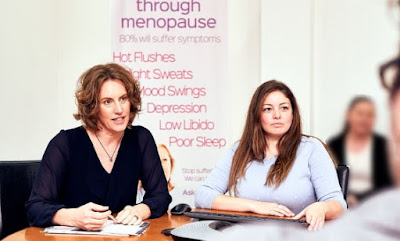Your Ultimate Guide To Menopause
Whether you are a woman in her late fifties or a concerned husband trying to understand your wife's possible symptoms, assuming information about menopause will do you more harm than good. It is also equally bad to ignore facts about menopause altogether and resort to simply guessing. So, for today's blog post, we are going to discuss every important detail about the natural process every woman goes through at some point in her life.
Before we go into the fun and factual tidbits,
it's essential that you are aware that menopause isn't a medical condition on
its own, nor is it a disease in any way. While there are times when menopause
can lead to certain conditions that need further medical assessment, menopause
remedies according to Australian Menopause Centre
are easy to understand and do even on your own.
However, if you aren't comfortable enough or
you are learning about this process for someone you love who might be going
through it, it's a great idea to visit a menopause
clinic Melbourne such as Australian Menopause Centre
and request assistance and proper guidance on how to deal with it.
For now, let's break down everything you must
know about menopause.
· Signs
And Symptoms
Menopause tends to show natural changes in a
woman's body once she reaches a certain age. During this time, women commonly
experience different symptoms such as hot flashes, irregular periods, lower
fertility, as well as vaginal dryness. Before you react negatively to these
signs, know that these symptoms are all natural and are extremely normal for a
woman in the menopausal stage.
Perhaps the most common sign of menopause
appears in the form of irregular periods, and it is also generally the first
symptom to show. With irregular periods also comes lower fertility, which means
the woman's estrogen levels significantly drop and reduces her chances of
becoming pregnant. Other usual symptoms also include night sweats, which are
similar to hot flashes, disturbed sleep, urinary problems, as well as emotional
changes.
· Complications
As mentioned earlier, while menopause isn't a
condition itself, it can still lead to the development of complications. Some
of the most common complications include but are not limited to cardiovascular
diseases, osteoporosis, urinary incontinence, and breast cancer.
· Treatments
Since all women go through menopause at some
point, the need for treatments isn't typically required. However, there are
available options to treat the symptoms of menopause, including hormone
replacement therapy and self-management. Most women usually don't seek medical
assistance for menopause symptoms, but it is perfectly fine and encouraged to
visit a doctor should you want.
· Diagnosis
Since
it is a natural process for women, menopause isn't usually diagnosed. Still, a
doctor can diagnose a woman for it once age, menstrual patterns, and other
physical signs are verified. You can also consider getting tests such as a
follicle-stimulating hormone test or a typical blood test to confirm menopause
symptoms.
Final
Word
Menopause, while being a natural process in the
body of a woman, can still cause drastic changes and severe symptoms,
especially without the proper information. If you are currently experiencing
some of the signs or you know someone who does, refer them to a clinic such as
the Australian Menopause Centre to get everything checked out.




Comments
Post a Comment